Databases of social sciences
There are two main platforms which contain databases focused on social sciences, Esbcohost and ProQuest. Their main features are showcased below.
Both platforms contain some subject-specific (sub)databases and more general ones.
Ebsco maintains one generic database of its own: Academic search premier. It’s quite small for a multidisciplinary database. Through Ebsco platform, it is possible to use more specialized databases as well, either one database individually or together with other databases.
- SocINDEX for social work, sociology, social psychology and related topics/areas/disciplines (?).
- PsycINFO (APA) for behavioral sciences, mental health and psychological aspects of various topics.
- EconLit for the fields of economics, e.g. capital markets, economic forecasting, health economics (?), monetary theory, urban economics.
- Business Source Elite for marketing, management and other business studies.
The selection of databases is done using this link:
![Screen capture of Ebscohost search form with a highlighted hint: in Ebscohost database in changed from the current Searching [database name] -link above the search box.](https://blogs.uef.fi/ueflibrarypostgrad/wp-content/uploads/sites/33/2025/06/M2_Ebsco_db.png)
You can access any EBSCO database through UEF Primo and change the selection at any time during the session.
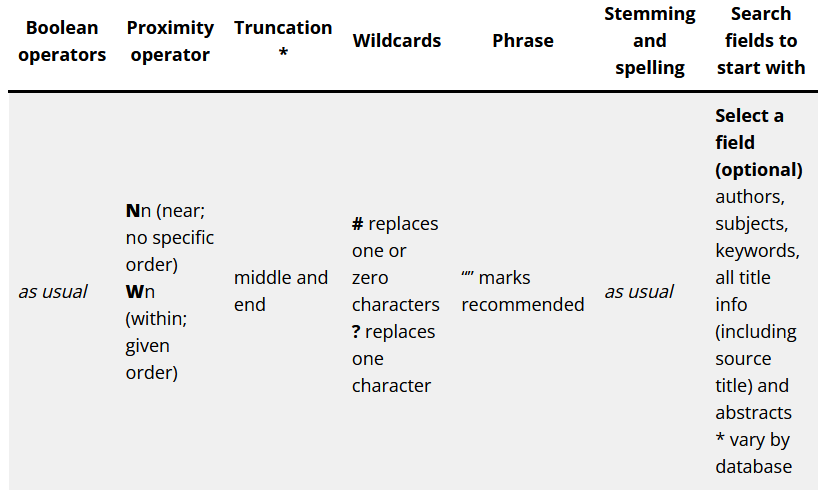
Technical characteristics of Ebsco databases.
Search query example
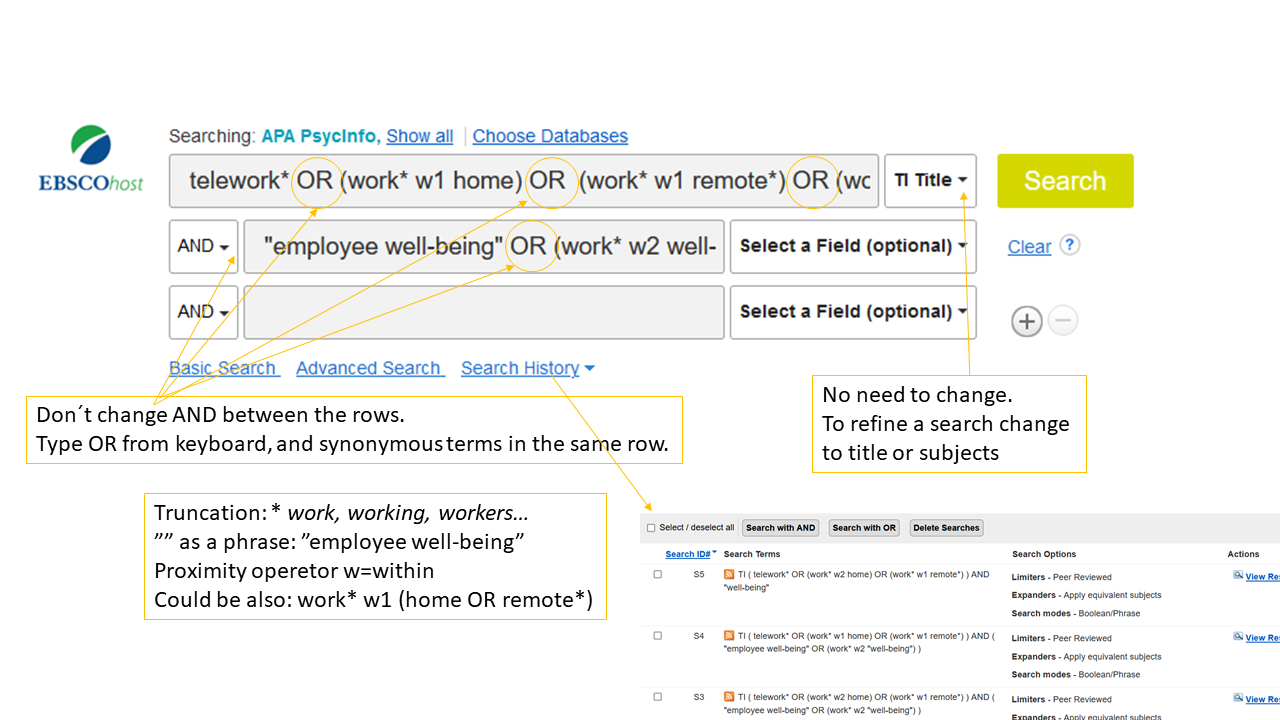
Search query example about workers’ well-being when working remotely.

Search query example about workers’ well-being when working remotely.
Refining/limiting the search (filters)
- Don’t limit to full-text, as it excludes available peer-reviewed articles.
- Peer-reviewed (scholarly) journals, academic journals, when you want to exclude non-scholarly articles, conference proceedings, book chapters etc. which some of the databases contain.
- Publication year, language
Video tutorials
(links open in new tabs):
Using search terms, limiting, editing, saving – ignore the last minute, not applicable in UEF library:
Academic Search Premier General Tutorial (5:56)
Setting notifications about new results:
Creating a Search Alert in EBSCOhost (1:28)
Use of thesaurus terms:
Browsing Subject Terms in EBSCOhost Databases (2:23)
ProQuest consists of several sub-collections, which all contain several individual databases. These can be searched separately or together.
ProQuest Social science premium collection broadly covers different fields of social sciences; sociology, social policies, social services, social work, political science and public policy, criminal justice, education, linguistics, library and information science etc.
Since the results come from different databases, there might be duplicates or even triplicates in the search results.
It’s good to begin with this broader collection, and to filter the search query by databases afterwards. You may also choose the combination of databases before a search.
The selection of databases is done using this link:

You can access to any ProQuest database through UEF Primo and change the selection any time during the session.
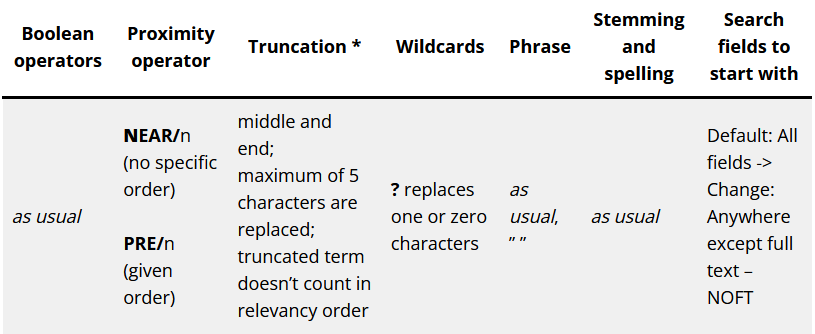
Technical characteristics of Pro Quest databases.
Search query example


Refining/limiting the search (filters)
- Don’t limit to full-text, it excludes available peer-reviewed articles.
- Peer-reviewed, academic journals, if you want to exclude non-scholarly sources or conference proceedings, book chapters, reports, government publications, dissertations.
- Publication year, language if needed.
- Filter by more focused database
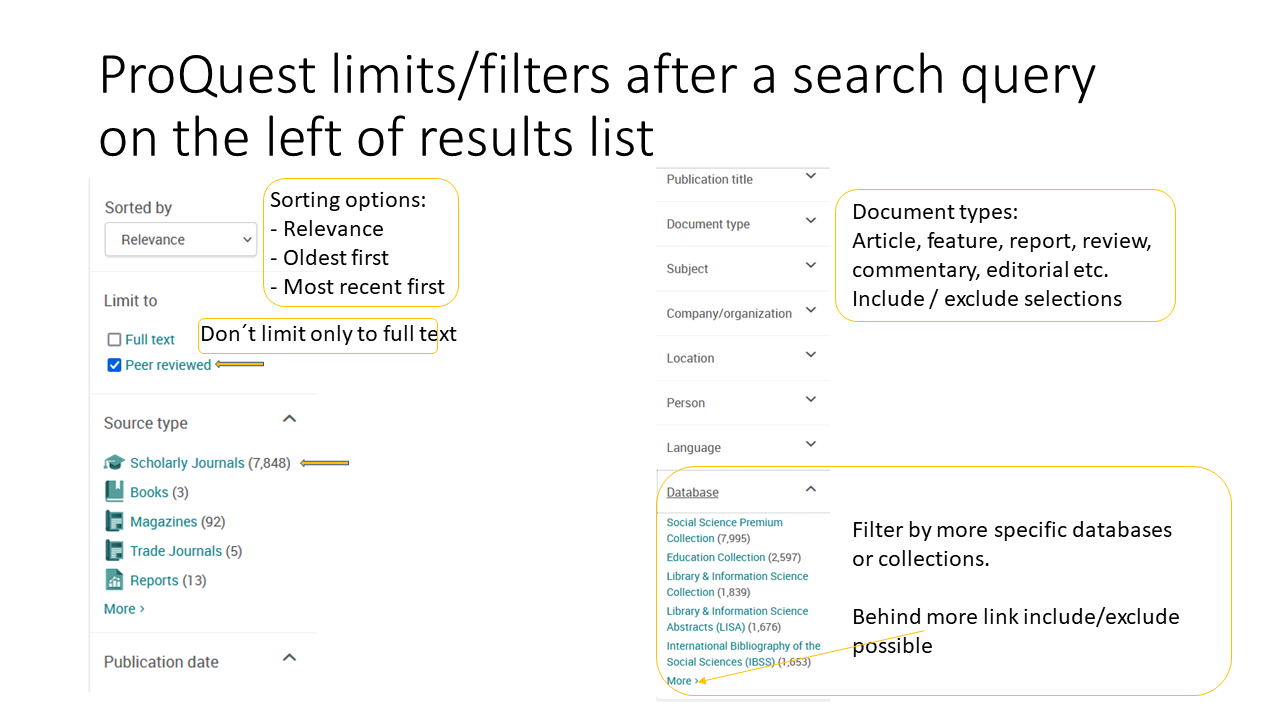
ProQuest limits.

ProQuest limits.
Video tutorials
(linsk open in new tabs)
Search fields and thesauri:
Advanced search (5 min)
Search terms and operators:
Search strategy tips (7 min)
All tutorials by Proquest: ProQuest platform libguides
Read more about the additional, but still essential databases by field of science:
There are two more specific and business/economics-focused databases, Business Source Elite and EconLit on Ebscohost platform. They have lots of overlapping sources, so it is practical to search those parallelly: choose databases. See above under the Ebscohost databases heading.
Econlit covers broader document types in addition to journal articles, e.g. dissertations, working papers and books from all fields of economics.
Scopus is also worth searching from, especially for data science topics. If necessary, filter with subject areas: Business, Management and Accounting or Economics, Econometrics and Finance. This is based on the journal categorization.
Business studies information resources (opens in a new tab).
Scopus and Web of Science are the main sources for geography. However, you may also make use of another discipline that you are interested in, like a business database for economic geography; engineering for GIS, etc.
Also ProQuest Social Science Premium Collection (see information at the upper part of this page) is worth searching regarding social phenomena questions.
Jstor
Jstor Arts & Sciences I Collection (link opens in a new tab) database is the best UEF-specific database for history, even though it covers multiple other disciplines as well. It covers journal articles from as early as the 19th century – some documents date back even from 1665.
For many journals, the most current volumes are not available, so you will have to search for them through some other database.
The database contains both journals articles and books, but only the articles are available as full texts in UEF.
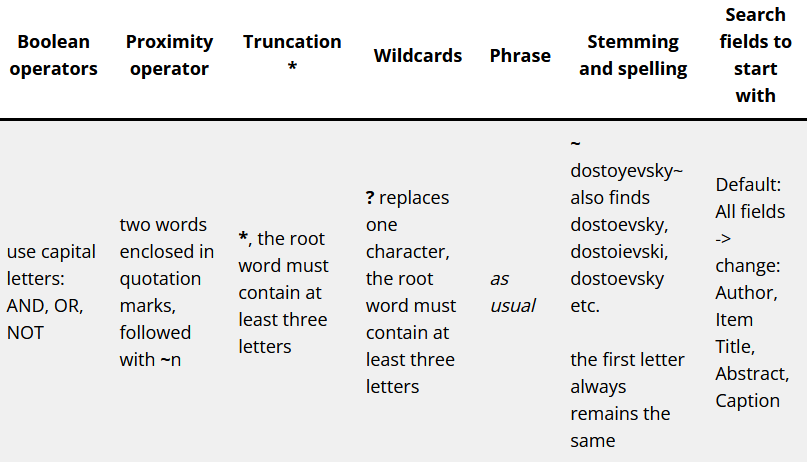
Technical characteristics of Jstor database.
Video tutorials
(links open in new tabs):
Searching, limiters, editing:
Advanced search on JSTOR (7:46)
AI-search with an article:
How to use Text Analyzer to make a reading list (3:23)
In law and legislation, the primary legislation is an essential source. This information can be found from Edilex– ja Finlex-services (Finnish law) and from EUR-Lex and Curia (EU law). Only parts of the Finnish legislation is translated in English (can be found for example from English pages of Open Access Finlex). In addition, there are some services containing Finnish textbooks, like Verkkokirjahylly and Verkkokirjahylly (Päivittyvät hakuteokset). See the complete list of law-related databases on the library’s website.
Edilex
Besides the up-to-date legislation of Finland, Edilex contains (among other things) legislative history, case law from various Finnish court instances and a vast digital law library. You can find the most relevant Finnish law journals from recent years in full text and legal articles specially written for Edilex by Finnish experts. When searching you don’t have to truncate words or use AND operators (they are assumed automatically).
Academic Core Collection by HeinOnline
Academic Core Collection HeinOnline contains many databases, but the most important of them is Law Journal Library, which you should select at the start page. This is the first database to start when looking for international articles in law and legislation.
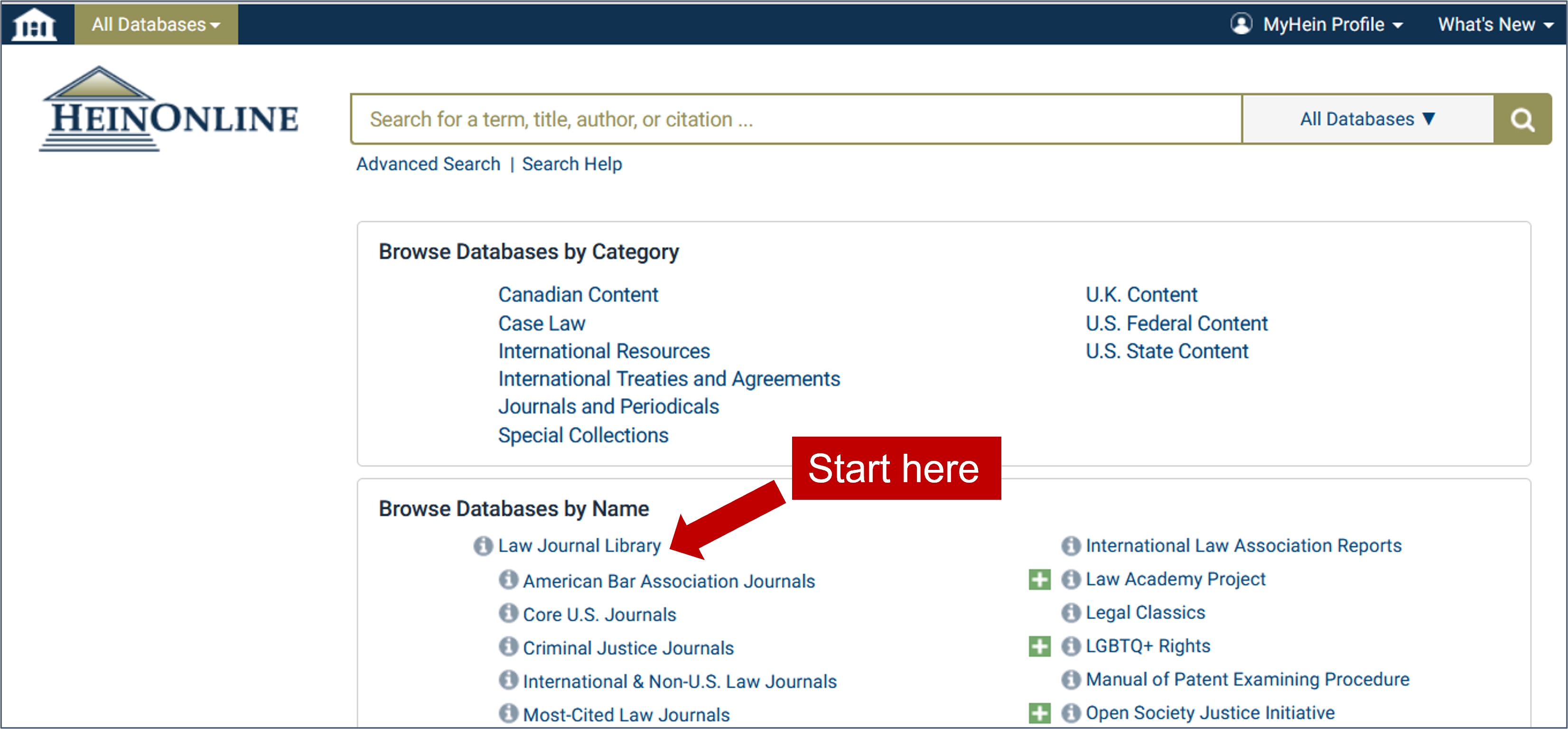
Link to Law Journal Library on HeinOnline homepage.
HeinOnline contains more than 3 000 law and law-related periodicals as full texts from the late 19th century onward. In some cases the most recent years are missing. Document types include journal articles, periodicals, legal classics and case law.
Sometimes you get only bibliographical information about articles. In that case you can try to find full text access to the journal in question through UEF Primo or Westlaw.

Technical characteristics of HeinOnline database.
Search query example
![A screen capture of Heinonline. the link for Advanced search is under the quick search line. In advanced search there is a search query: "environmental law" [in Text] AND finnish OR finland [in Article title].](https://blogs.uef.fi/ueflibrarypostgrad/wp-content/uploads/sites/33/2022/07/MOD2_heinonline2.png)
Video tutorials
(links open in new tabs)
How to get started in HeinOnline (4:27)
How to search in HeinOnline (6:40)
Complete list of HeinOnline tutorials
Westlaw
Westlaw is an online legal research service which contains more than 40 000 databases. It is primary aimed for US lawyers and legal professionals and therefore concentrates in US case law.
Document types include case law, legislation, law reviews, treaties, news material etc. The full text coverage varies by publication, but is available at least from 1970s onward.
For law students in Finland the most useful part of Westlaw is the database World Journals, which contains 984 law journals from USA, 40 from United Kingdom, 12 from Canada and few more from United Arab Emirates, Europe, Australia and Far East (in 2022). These journals are not listed in UEF Primo journal search, so you must check for them from Westlaw directly.
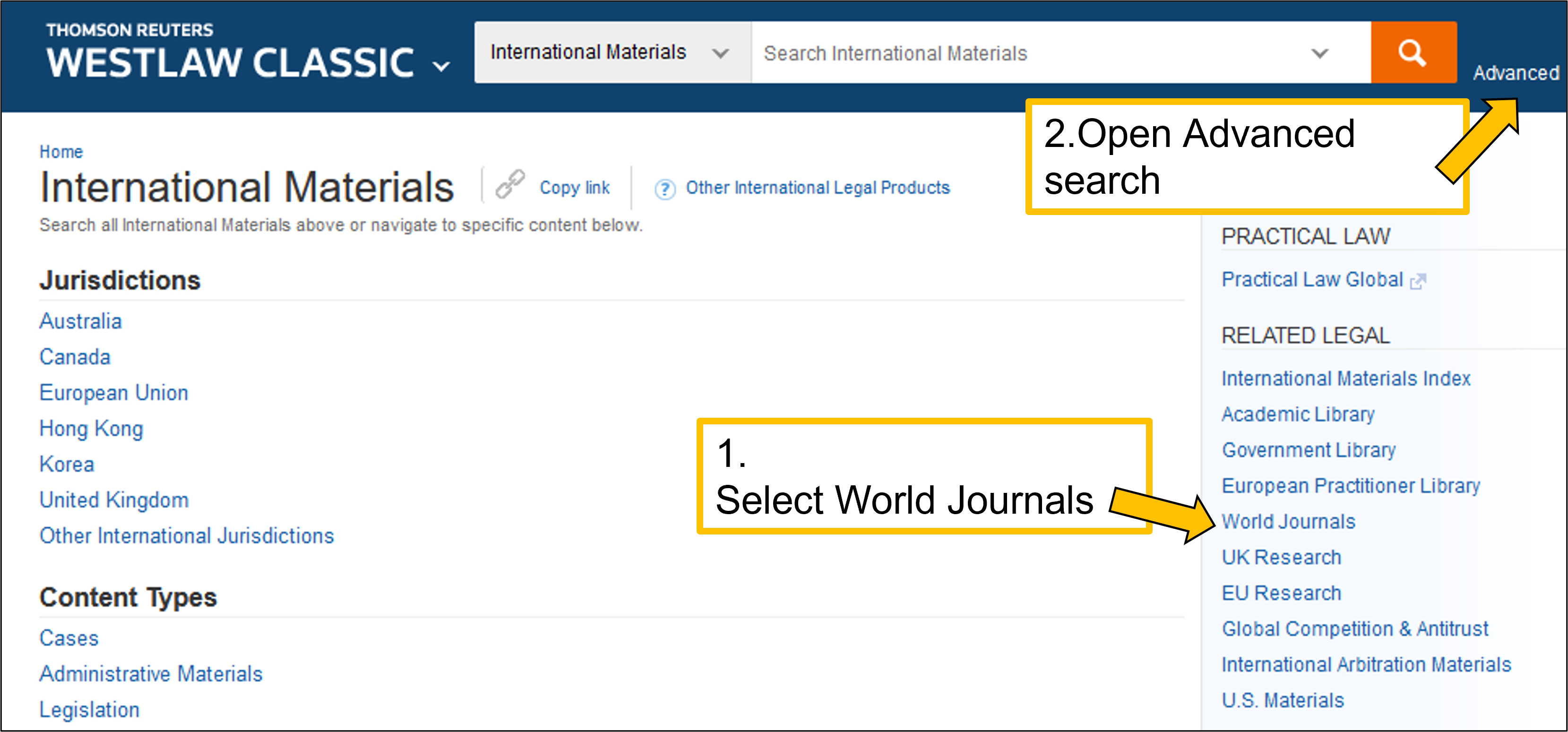
Link to World Journals on Westlaw homepage. Advanced search is recommended for searching.
Westlaw is the only way to access many US law journals, and you might also find access to volumes which are missing in HeinOnline or some other databases. However, the user interface is very old fashioned and you can’t for example browse through issues or volumes of the journals, you can only make searches for relevant articles with keywords.
And even though you get full text of articles, they are not in PDF. The whole content of the article (including page numbers, references, tables and possible pictures) is available though.

Technical characteristics of Westlaw database.
Search query example
![A screen capture of Westlaw search page. The query is "environmental law" AND (finland OR finnish) [in Title]. Terms 'environmental law' are written in a box labelled 'This exact phrase'. Terms 'finland OR finnish' are written in a box labelled 'Name/Title (TI)'. The terms written in boxes are automatically formulated as a search query, which is written on the top of the page. On the right side bar there are special characters, which can be used for modifying the query afterwards.](https://blogs.uef.fi/ueflibrarypostgrad/wp-content/uploads/sites/33/2022/07/MOD2_westlaw_query.png)
Multidisciplinary databases (Scopus, Web of Science) and databases for health sciences are important depending on the research topic. EconLit is worth trying for topics on health economics, and in addition for research areas on social services ProQuest social science premium collection (see upper part of the page).
If multidisciplinary and large databases give too many results, there are a few more focused databases:
SocINDEX (Ebscohost), sociology, social work and related fields
- a broad spectrum of sociological studies; encompassing all subdisciplines and closely related areas of study. These include abortion, criminology & criminal justice, demography, ethnic & racial studies, gender studies, marriage & family, political sociology, religion, rural & urban sociology, social development, social psychology, social structure, social work, sociocultural anthropology, sociological history, sociological research, sociological theory, substance abuse & other addictions, violence and many others.
- document types: journal articles, reviews, conference proceedings, books, theses, trade articles
Link to SocIndex in UEF Primo (opens in a new tab)
PsycINFO (EBSCOhost), behavioral science and mental health.
- included is information on the psychological aspects of related fields such as medicine, psychiatry, nursing, sociology, education, pharmacology, technology, linguistics, anthropology, business, law and others.
- document types: journal articles, books, book chapters, dissertations.
Link to PsycInfo in UEF Primo (opens in a new tab).
Sociological Abstracts (ProQuest) and its companion file, Social Services Abstracts
- cover the international literature of sociology, social work and related disciplines in social and behavioral sciences
- document types: journal articles, book reviews, books, book chapters, dissertations, conference papers, and working papers.
It is possible to search those one by one, or after a search filter by database.
Link to Sociological Abstracts in UEF Primo (opens in a new tab)
Link to Social Services Abstracts is not available in UEF Primo, but you can choose the database after opening Sociological Abstracts or any other ProQuest database..
Video tutorials
(links open in new tabs):
Search technique:
Searching in SocINDEX (2:44)
How to Use Sociological Abstracts (4:38)
Thesaurus, cited references:
Analysing search results in SocINDEX (2:12)
It’s good to also remember the multidisciplinary databases, Scopus and Web of Science. It’s possible to filter the results by subject area/category, or search only the Web of Science edition SSCI, Social Sciences Citation Index. Scopus covers more articles/journals on social sciences than Web of Science.